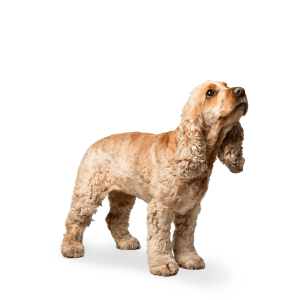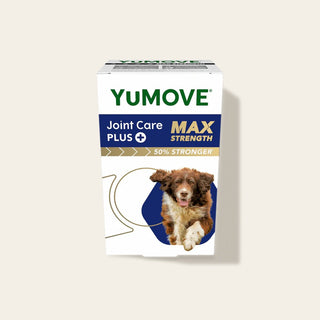

Doggy Digestion: What Should You Feed Your Dog?
Whether you are a new pet parent, the owner of a fussy eater or are just trying to switch up your dog’s diet, you may be wondering what you should feed your dog.
Just like with humans, a dog’s diet plays an essential part in their overall health and well-being. The wrong diet could cause potential health issues such as obesity, which in turn applies pressure to the joints and could contribute to joint stiffness.
The right diet, however, can help them maintain a healthy weight and an active lifestyle - so your dog can work, rest and play in peace!
In this guide, we answer some common questions for dog owners who are wondering where to start when it comes to their dog’s diet.
Why is a dogs diet so important?
Good nutrition is an important part of maintaining a healthy lifestyle - whether you are human or canine! When combined with regular physical activity, a balanced diet can help to reach and maintain a healthy weight, and promotes overall health.
Your dog’s diet is just as important as yours. Whilst their digestive systems and taste buds may not be as complex as ours, it is important to ensure that your dog is getting all the nutrients they need. Their diet should be balanced and pet parents should be careful not to overfeed - as dog’s cannot exercise themselves, too much food and too little exercise can result in them becoming overweight or potentially, obese.
Is your dog overweight?
If your dog is overweight, this can create added pressure on the joints and contribute to the cause of joint stiffness, as well as leading to other potential health issues. Whilst much of this can be prevented with regular exercise, the right diet will keep them slim, healthy and in good condition.

What should you feed your dog?
There are several variations of doggy diets - from dry foods to wet dog foods to raw feeding - or a combination! Naturally, there are benefits and negatives for each type of feeding and, ultimately, the decision is yours to make.
With so many pet foods on offer, it can be difficult to know where to start. Here are some top tips for selecting the right food for your dog:
- Looking for foods which are labelled as ‘complete’. This means that the product is likely to provide many of your dog’s needed nutrients.
- Look for products from a company/manufacturer who is part of the Pet Food Manufacturers Association (PFMA). They voluntarily meet extra requirements.
- Ensure that the food is designed for your pet’s life stage – for example puppy food, adult food or senior food. If your pet has any added requirements (for example, they are very sensitive, active or pregnant) make sure the food is suitable for this, too.
- If you are unsure of which brand to choose, ask your local vet. They will have a good idea of which brands are established, high-quality and meet requirements.
- Try different variations and see which your pet likes the best - there are some things that can just come down to personal choice when it comes to pet food.

Ingredients in pet food
Some pet foods proudly state that they use ‘human-grade’ ingredients, or organic ingredients. Some manufacturers list their ingredients in full. All ingredients used within pet foods legally need to pass a vet inspection as ‘fit for consumption’.
Ingredients listed on pet food labels may include ‘meat and meat derivatives’ (a legal term for proteins from animal sources) or ‘oils and fats’ - this is an alternative that can be used rather than listing each single ingredient.
This is a labelling choice by the manufacturer and doesn’t always reflect the quality of the food or how good nutrition your pet will get from it. However, this can help you select the right pet food if your dog has a food allergy or a sensitive stomach.
Flavour
When it comes to selecting a flavour of dog food, the best flavour is the one that your dog enjoys eating! Just as humans have different taste preferences, some dogs seem to prefer, or dislike, certain flavours. Whereas other dogs may not be as selective. Trying different variations to see which your dog likes the best could be a good idea as this allows you to work out your dog’s likes and dislikes.
Texture
Some foods have different textures and that isn’t limited to human foods! Dog foods can come in different forms too, from pate to meat chunks to different sizes of kibble. Which texture you choose doesn’t really matter as long as your dog is happy eating it and is able to chew and digest the food properly.
How much should you feed your dog?
There are a number of factors to consider when figuring out how much you should feed your dog. Not only are you aiming to satiate their appetite, but you also need to be feeding your dog the right amount to ensure that they are getting all the nutrients they need to be strong, healthy and active. However, you don’t want to over-feed them.
The right amount of food for your dog will depend on its breed, type, age, health and activity level. For example, a working sheepdog naturally needs more energy than a smaller dog who spends most of their time indoors.

If your dog’s eating habits change or they need to lose or gain weight, this can also play a part in how much they need to be fed.
As a starting point, use the information printed on the food packaging as a guideline. When feeding your dog dry foods, weigh out their portions first. If you are unsure of the right amount to feed your dog, speak to a pet store assistant or your local vet, who will be able to give guidance on how much you should feed your dog.
How often should you feed your dog?
Most dog owners feed their furry friend twice a day; once in a morning and once in the evening. However, how often you feed your dog will again depend on various factors. For example, dogs with active lifestyles will need to be fed more often in order to keep up their energy levels.
If your dog is maintaining a healthy weight or has digestion issues, then they may benefit from being fed more often, with smaller portions.
If your dog is a healthy weight and is house-trained, then free feeding is also an option. Free feeding is when you leave food out all day and allow your dog to graze, eating when they choose to. This can be a good method for highly active dogs that burn calories easily.
If you are leaving food out all day for your dog to nibble on, use dry food, which won’t spoil.
How can YuMOVE Digestive Care for Dogs help?
Our Digestive Care Supplements for Dogs have been developed with a mix of probiotic and prebiotic ingredients to encourage healthy digestion. With active ingredients to increase good bacteria in the digestive system, our supplements are perfect for dogs with sensitive stomachs or food allergies. Not only do they inhibit legs of bad bacteria, but they can also help to reduce wind, keep stools firm and help your four legged friend stay active and healthy!
To find out how other pet-owners have found our YuMOVE Digestive Care product range, join us on Facebook and Instagram to discover our community of like-minded and dedicated pet-lovers.




